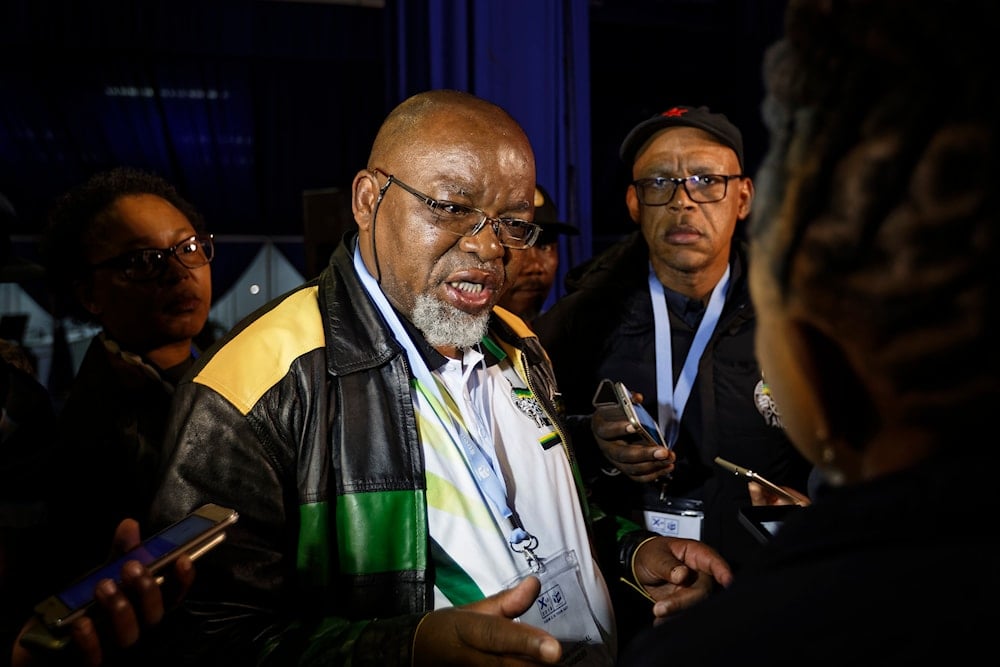South Africa says may consider nuclear projects with Russia, Iran
South Africa's minister of Mineral and Petroleum Resources says his country will cooperate with the country that's best in the field, regardless of which country it is.
-

Gwede Mantashe, Minister of Minerals and Petroleum Resources of South Africa, speaks to the media at the Independent Electoral Commission Results Center, May 9, 2019 (AP)
South Africa may consider Russia or Iran as potential partners to expand its civilian nuclear power capacity, a move that could increase the disconnection between the African country and the United States and further delay the renewal of a strategic energy pact, Reuters reported.
As the only African nation operating a nuclear power plant—Koeberg—South Africa aims to add 2,500 megawatts of new capacity to address persistent electricity shortages and curb emissions.
"We can't have a contract that says Iran or Russia must not bid, we can't have that condition," Gwede Mantashe, Minister of Mineral and Petroleum Resources told Reuters, adding that "if they are the best in terms of the offer on the table, we'll take any (country)."
The United States has been scrutinizing South Africa following Trump's executive order to halt foreign aid, with the order claiming that Pretoria was "reinvigorating its relations with Iran to develop commercial, military, and nuclear arrangements."
But President Cyril Ramaphosa’s office clarified that Pretoria has no bilateral agreements with Iran concerning nuclear power or related technology.
A planned South African tender for nuclear projects, initially set for last year, has been delayed for further consultations following legal challenges led by the Democratic Alliance, which was then in opposition and is now part of the coalition government.
For nearly a decade, Pretoria and Washington have been negotiating a new civilian nuclear pact—known as a Section 123 Agreement—a prerequisite for exporting US-made nuclear fuel or equipment. However, analysts warn that allegations outlined in Trump's recent executive order could complicate finalizing the agreement.
"The allegations made in the executive order can significantly complicate getting the agreement renewed," said Isabel Bosman, a nuclear energy researcher at the South African Institute of International Affairs.
The previous Section 123 agreement, in place since 1997, expired in December 2022. While technical negotiations for a new deal have been completed, legal processes on both sides remain unfinished, according to Zizamele Mbambo, a senior official in South Africa's Energy Ministry.
"As far as we know both sides remain firmly committed to conclude this new agreement," Mbambo added.
Failure to secure the pact could prevent South African power utility Eskom from sourcing reactor fuel from Westinghouse for Unit 1 at Koeberg, industry analysts say, while Unit 2 is supplied by France’s Framatome.
Additionally, the absence of an agreement may deter US nuclear firms, including the Bill Gates-backed TerraPower and ASP Isotopes, from investing in South Africa amid a global nuclear energy resurgence, analysts added.
Russia forms new nuclear partnerships
Russia formed several new partnerships with different countries at the beginning of 2025, signing agreements on nuclear energy with Iran and Vietnam in the same week.
Russia and Iran announced a new agreement on January 17 that aims to expand their nuclear energy collaboration, including building small-scale and large-scale power plants as part of a 20-year strategic treaty, building on the two countries' previous cooperation which included the Bushehr nuclear power plant.
On the other hand, Vietnam and Russia signed agreements including a nuclear energy deal that would revive Vietnam's long-dormant nuclear energy program to meet the demand of its increasingly large industrial sector, which is driving its economy.
Vietnam's Ministry of Science and Technology said that Director of Rosatom Alexey Likhachev showed a lot of interest in collaborating with the East Asian country on its Ninh Thuan nuclear power project, which involved the construction of two plants in the Nunh Thuan province.
The Russian nuclear corporation and the Republic of Congo signed memoranda of cooperation in July 2024 on the peaceful use of nuclear energy, to assert the partnership between Russia and the Congo in the energy sector.

 4 Min Read
4 Min Read








